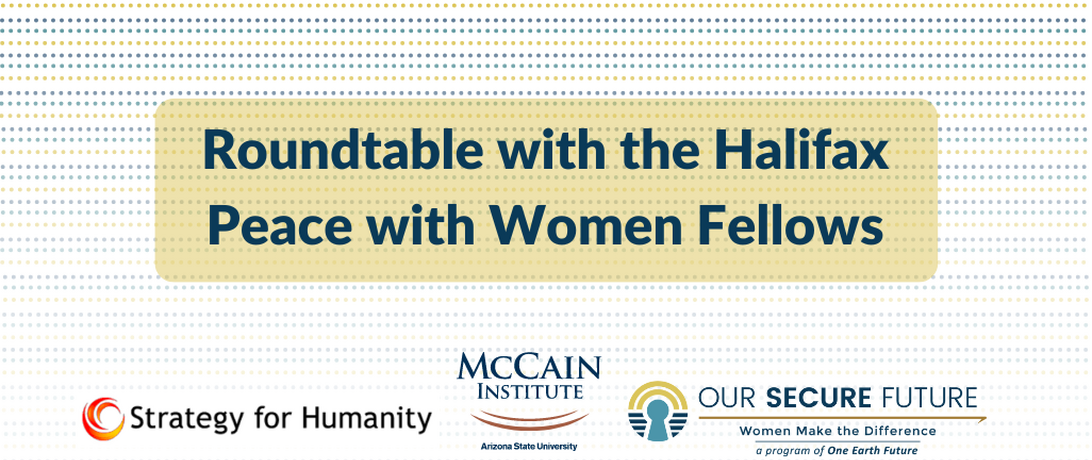
A discussion with the Halifax Peace with Women Fellows hosted by Our Secure Future, the McCain Institute, and Strategy for Humanity.
On October 27th, 2022, Our Secure Future (OSF), alongside the McCain Institute and Strategy for Humanity, hosted the Halifax Peace with Women Fellows for a discussion with key partners on Women, Peace and Security (WPS). During the discussion, partners shared their experiences and the fellows had time to ask questions and seek guidance and recommendations on how to implement WPS in their work.
The speakers included:
- Cailin Crockett: Director, Military Personnel and Readiness for the National Security Council / Senior Advisor to the White House Gender Policy Council
- Brooke Owens: Joint Staff J5 WPS Advisor
- Erin Cooper: Deputy Director for WPS Policy in the Office of the Secretary of Defense Global Partnerships, International Humanitarian Policy Directorate
- Hans Hogrefe: Our Secure Future Congressional fellow
- Sahana Dharmapuri: Vice President of Our Secure Future
The speakers covered their deep knowledge and expertise advocating for WPS in their respective roles and fields. Hans Hogrefe discussed his work as OSF’s Congressional fellow, which centers around the translation of WPS into the domestic sphere. Mr. Hogrefe stated, “Congress acts as a catalyst for thematic ideas like WPS, the Global Fragility Act, and the Atrocity Prevention Act.” The Global Fragility and Atrocity Prevention Acts outline U.S. efforts in promoting stability in conflict-affected countries and preventing future mass atrocities.
Cailin Crockett discussed the Biden/Harris administration’s work on WPS. This includes President Biden’s commitment to an Independent Review Commission (IRC) on Sexual Assault in the Military while campaigning. The recommendations made by the IRC are now starting to be implemented by the DoD. The four lines of effort outlined in the recommendations are accountability; prevention; climate and culture; and victim care and support.
Ms. Crockett further remarked on DoD’s commitment to women as vital contributions to the force. She gave the example of the recently signed DoD memo to ensure that service members and their families can access reproductive healthcare in light of the Supreme Court’s decision in Dobbs v. Jackson Women’s Health Organization. The memo states that this ruling, “has impacted access to reproductive health care with readiness, recruiting, and retention implications for the Force.”
The work of interagency gender advisors and training was also highlighted throughout the discussion. Brooke Owens explained that gender advisors work to mainstream WPS and raise each agency’s capabilities to address it in their activities. A component of Ms. Owen’s work is to revise the WPS training for the U.S. Department of Defense (DoD) personnel. A recommendation of the IRC on Sexual Assault in the Military was to implement requirements for integrating WPS into professional education and training. Ms. Owens explained that the ultimate goal of this training is to get key DoD leaders to understand how to apply WPS into their everyday work.
The Halifax Peace with Women Fellows are senior, active-duty, military officers from various NATO member and partner countries. One fellow asked how the U.S. could learn from other countries’ military systems. The example of Sweden was given, where, in 2017, the country introduced a military conscription for men and women. Norway and at least 10 other countries have adopted a similar policy. While Sweden was mentioned as a country the U.S. could learn from with regards to the military, it was noted that this recent policy was gender blind, as it is based more on qualifications and does not take a transformative approach to equality between men and women in the military.
The discussion ended with a question on how WPS is viewed within the broader framework of equality. Erin Cooper explained that the WPS requirements being implemented on an institutional level, which help to mainstream women's perspectives in decision-making, are a step towards achieving equality on a greater, transformative scale.
You can read more about the Halifax Peace with Women Fellowship here.